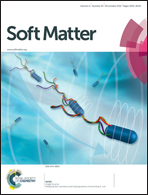Hydrophobicity: effect of density and order on water's rotational slowing down
Abstract
Ab initio molecular dynamics (AIMD) simulations of over 4.5 ns were performed in the temperature range of T = 260–350 K with van der Waals corrections to investigate the relationship between local water density and tetrahedral order in bulk water and in the presence of a hydrophobe, tetramethylurea (TMU). We demonstrate that in bulk water, defects consisting of 5- and higher coordinated water are a major contributor to dynamics. Close to a hydrophobe, 3-coordinated defects take over. The co-existence of these defects gives rise to very different local densities. We propose that the slowing down of rotational motion close to a hydrophobe is induced by an interplay between density and order with the slowing down decreasing in the following order: (i) low-density ordered-water, (ii) normal-density ordered-water, (iii) high-density ordered-water and (iv) disordered-water. The proportions of these water environments vary with temperature. These local environments also support the idea of water's polymorphism, i.e., the existence of the high- and low-density states in supercooled water.


 Please wait while we load your content...
Please wait while we load your content...